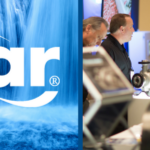Ammonia is perhaps most well recognized as a household cleaner. However, ammonia commonly makes another important contribution to daily life as a natural refrigerant. It is responsible for the year round availability, volume and variety of food and beverages served daily on breakfast, lunch and dinner tables around the world. The use of ammonia as a refrigerant is definitely among the most important developments of modern times, and a significant contributor to our modern lifestyles.
The History of Ammonia Refrigeration
Facts about ammonia as a natural refrigerant and its use throughout history.
Environmental Advantages
Explore some of the major advantages ammonia refrigeration has on our environment.
Economic Advantages
Learn about some of the advantages natural refrigeration has on our economy.
Development of Mechanical Refrigeration
The development of mechanical refrigeration dates back to the early days of the industrial revolution. Today, ammonia remains the most commonly used refrigerant in large industrial systems to process and preserve most food and beverages. Ammonia has been in the forefront of advances in refrigeration technology making it is essential to the food processing, storage and delivery infrastructure of our economy. More recently, ammonia refrigeration systems have been used for air conditioning in publically accessed buildings and increasing output efficiencies for power generation facilities. NASA also recognizes the advantages of ammonia as a refrigerant, selecting ammonia for use on the Space Station.
With heighted attention given to global warming and the extraordinary international efforts made over the past decade to reduce the use of refrigerants harmful to the environment, combined with its economic advantages, ammonia is well positioned to be the refrigerant of the future.
From an Operational Perspective
From an operational perspective, ammonia is generally accepted as the most efficient and cost effective industrial refrigerant, an important benefit to consumers because lower operating costs contributions to lower food prices. Beyond the economic advantages, as a natural refrigerant, ammonia is a environmentally benign in the atmosphere.
The Advantages of Ammonia in Refrigeration are Well Known
The advantages of ammonia in refrigeration are well known. Ammonia does not destroy atmospheric ozone and does not contribute to the greenhouse effect linked to global warming. In fact, ammonia, one of the most common compounds found in nature, is essential to earth’s nitrogen cycle and its release in the atmosphere is immediately recycled. The use of ammonia as a refrigerant is consistent with international agreements on reducing global warming and ozone depletion, and because of its proven applicability as a safe and efficient refrigerant for over 150 years, it is immediately available for wider usage and new applications. From a purely economics analysis, without unnecessary regulatory burdens, ammonia should find broader applications as a refrigerant than it currently enjoys.











